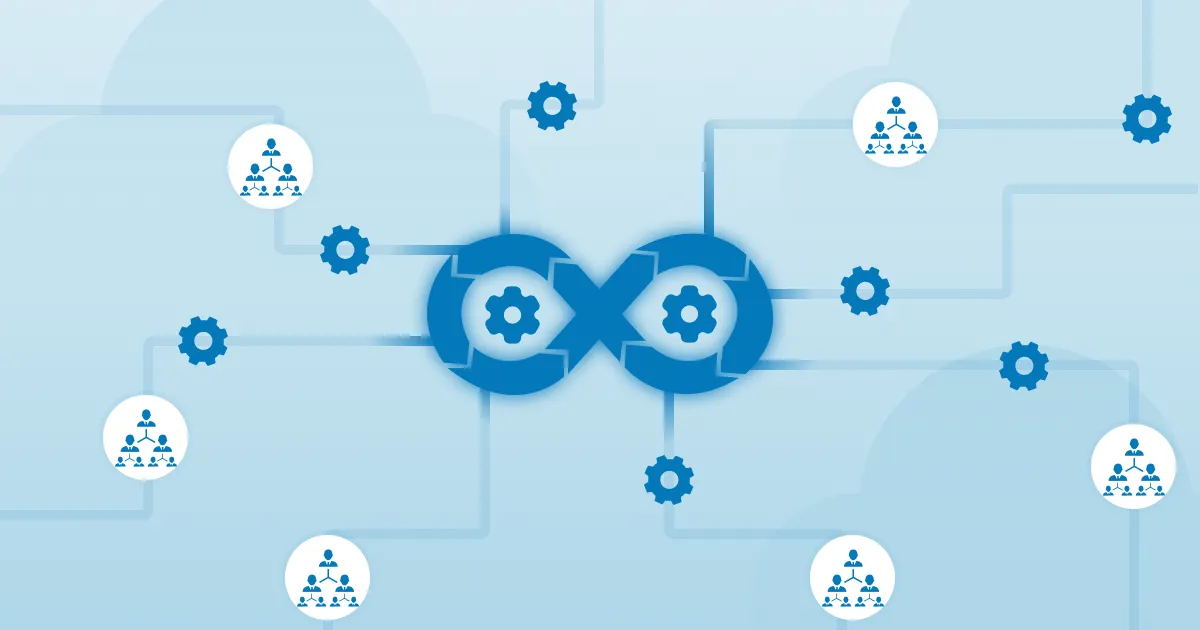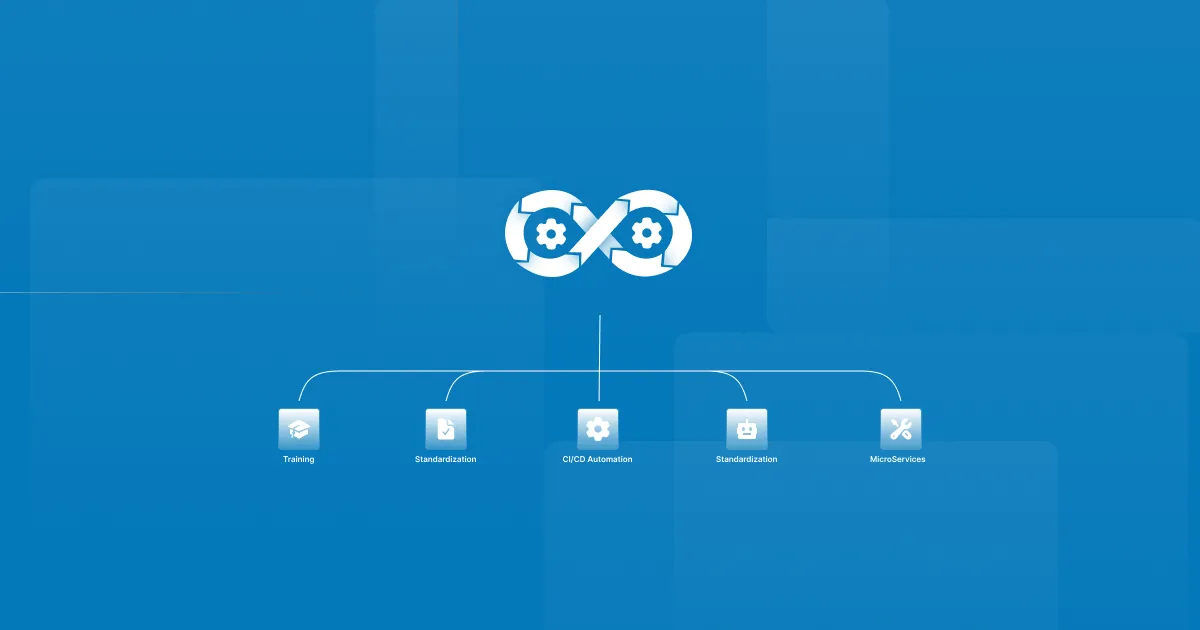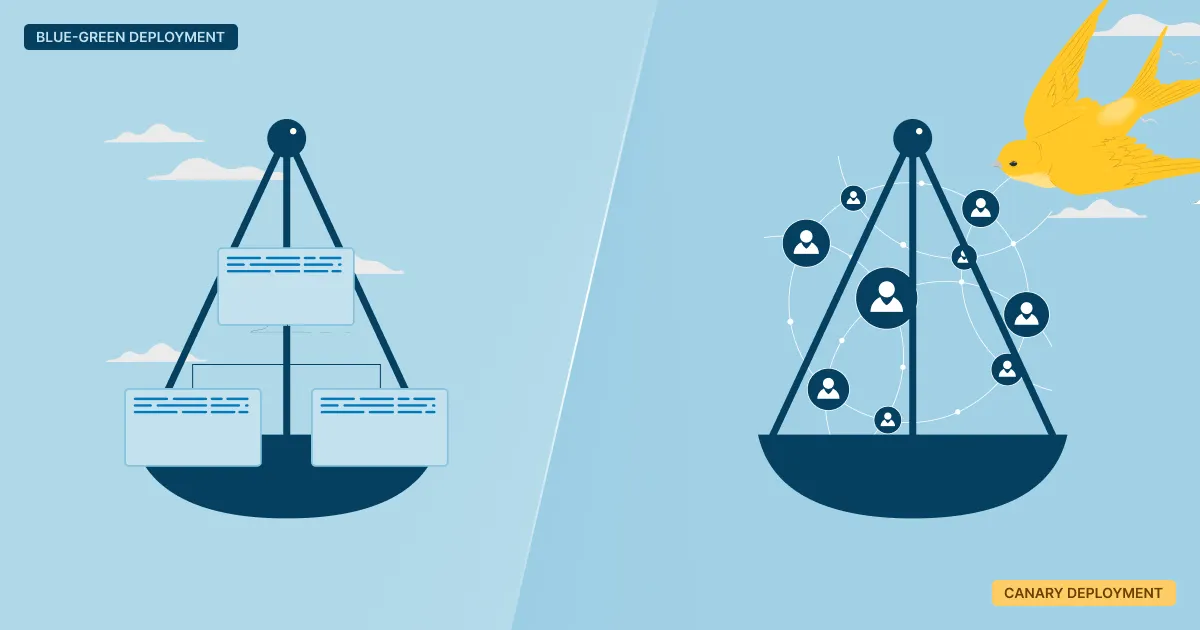Unlocking DevOps Potential: Best DevOps Practices for Scaling Across Teams

The world of development and operations demands that organizations seek faster software delivery and improved collaboration. This would help them thrive, grow, and modernize their pipelines. And it is a fact since almost all have stated that DevOps has positively impacted their organization.
As companies grow, scaling DevOps beyond pilot projects and small teams helps maintain agility, quality, and speed. In this blog, we explore the best DevOps practices for scaling effectively across multiple teams, ensuring alignment, automation, and culture thrive in complex environments.
Key Challenges When Scaling DevOps
Scaling DevOps across a large organization inevitably introduces distinct challenges. They are often a result of technical hurdles and internal resistance, which is one more reason to address them early.
Data Security Concerns
It's the job of DevOps teams to handle sensitive customer and company data. It's a must-have solution to protect privacy and ensure data security throughout the software development lifecycle. It is also one of the reasons that securing all stages, from planning to production, is a continuous challenge.
High Complexity
DevOps scaling involves many simultaneous activities. As a result, integrating the various tools and technologies across an organization can become complex and time-consuming. On top of that, managing multiple teams, diverse cloud environments, and extensive automation workflows certainly adds to the complexity of the situation.
Cultural Resistance
It's not a novelty that teams may resist changes to establish processes. Depending on the department, teams often have different levels of experience or willingness to adopt new practices. At the same time, the traditional silos and rigid hierarchy can also hinder the progress. This is why it's important to have clear communication about the benefits of the process. Fostering your employee participation is yet another way to overcome this resistance.
Skill Gaps
The DevOps sector is continuously evolving, which is the reason it demands diverse skills in areas like cloud computing, automation, and security. Many DevOps departments can be strained due to a shortage of internal expertise and difficulty finding qualified external consultants. It's the reason many companies should insist on continuous training and upskilling programs.
Budget and Resource Limitations
Constraints in allocating budget and resources for DevOps scaling are something even large companies can face. This is why it's important to prioritize investments based on return on investment. Companies must prioritise finding ways to save costs, such as using cloud computing or open-source tools.
Tool Sprawl and Integration Issues
The number of tools can significantly increase as more teams adopt DevOps. This leads to fragmentation and inefficiency without clear standardization. It is no wonder, then, that the integration of diverse CI/CD tools and their dependencies across multiple teams turns into a challenge.

Best Practices for Scaling DevOps in Your Organization
Knowing the challenges that can arise, we can see that scaling DevOps successfully requires more than just expanding teams or adding tools. It demands a thoughtful approach that combines culture, automation, and clear processes.
Growing organizations will find that maintaining speed, collaboration, and quality becomes increasingly challenging. Implementing proven best practices comes in handy to break down silos, standardize workflows, and enable continuous improvements.
Below you'll find key DevOps practices that empower enterprises to scale DevOps efficiently while preserving agility and reliability.
Create a Clear and Unified DevOps Strategy
One of the most important DevOps practices is to have a clear, organization-wide strategy that aligns with business goals. During the scaling DevOps process, the leadership must communicate how the automation, collaboration, and CI/CD support faster time to market, cost efficiency, and higher software quality.
A practical approach is to pilot DevOps in one product line or department and measure the success with consistent metrics. Then you can expand gradually while maintaining alignment across teams. It's a phased rollout that allows learning and adoption while reducing risks anticipated with quick scaling.
Foster a Collaborative and Inclusive DevOps Culture
If you are looking for the backbone of a successful DevOps scaling, then that's culture. It is important to break down silos between development, operations, QA, and security teams. Open communication, continuous feedback, and shared responsibility are the culture that every organization should nurture.
Support the cross-functional teams that offer diverse expertise and, in turn, provide faster problem-solving and innovation. At the same time, regular forums, such as quarterly DevOps community days, encourage knowledge sharing, showcase new tools, and highlight success stories.
Standardize Tools and Processes to Reduce Complexity
Tool fragmentation often hinders scaling efforts, making it challenging for teams to work efficiently across the organization. By standardizing on a core set of tools and processes, teams can simplify integration and reduce overhead, ensuring smoother collaboration. It should deal with essential areas such as version control systems, CI/CD platforms, configuration management, and monitoring solutions.
In addition to unified tooling, it’s important to establish clear coding standards, security practices, and deployment workflows that are documented and enforced organization-wide. This way, teams will collaborate seamlessly and accelerate the onboarding process for new members. It will surely help everyone stay aligned and productive.
Invest in Skills Development and Training
Scaling DevOps requires that all teams possess the necessary skills in cloud computing, automation, security, and collaboration tools. To build this expertise, organizations should invest in ongoing training and certifications that keep teams up to date with the latest technologies and DevOps practices.
When an organization prioritizes upskilling, teams learn how to:
- Use cloud platforms effectively
- Adopt new technologies swiftly
- Maintain security compliance throughout the development lifecycle
It's that commitment to continuous learning that will reduce the dependency on external consultants.
Build a Scalable and Automated CI/CD Pipeline
A strong CI/CD pipeline is the foundation for scaling DevOps, as it streamlines the entire software delivery process. Automation plays a key role by reducing manual errors, accelerating deployments, and ensuring consistency across teams. Managing complex pipelines efficiently is now easily done with the use of popular tools. These help organizations to centralize build, test, and deploy workflows.
Complementing CI/CD automation, IaC tools are used to automate environment provisioning. It's a way for teams to replicate infrastructure reliably and quickly, supporting consistent deployments at scale. Integrating automated testing within these pipelines maintains high software quality. And to detect and resolve issues proactively and receive real-time feedback, the use of continuous monitoring and observability tools is necessary.
Embrace Microservices and Modular Architectures
Adopting a microservices architecture supports scaling by allowing independent teams to own and deploy services autonomously. This modular approach enhances agility, reliability, and scalability, as teams can update individual components without affecting the entire system.
That said, managing microservices introduces complexity that requires strong monitoring, tracing, and testing frameworks to maintain control and visibility. To address this, containerization platforms, combined with service meshes, help orchestrate, secure, and manage microservices effectively at scale.
Use AI-Powered Platforms for Cloud and DevOps Automation
Modern AI-powered platforms like Microtica provide dynamic infrastructure automation, real-time monitoring, and cost optimization tailored to DevOps needs. AI can generate best-practice cloud setups by simply describing infrastructure requirements.
Beyond automation, AI root cause analysis and remediation accelerate issue resolution, minimizing downtime and improving reliability. In the meantime, as their cloud environments grow, organizations can control expenses through detailed cost breakdowns and savings recommendations. These capabilities make such platforms especially valuable in multi-team settings.
Final Thoughts
Successfully scaling DevOps is less about quick fixes and more about thoughtful evolution. It requires aligning teams around shared goals, streamlining processes, and continuously adapting to new challenges.
Organizations that embrace these DevOps practices can transform complexity into a competitive advantage by focusing on collaboration, automation, and consistent standards. In doing so, they not only speed up delivery but also build resilient systems and empowered teams ready to tackle the demands.
Subscribe to receive the latest blog posts to your inbox every week.
*By subscribing you agree to with our Privacy Policy.

Relevant Posts



